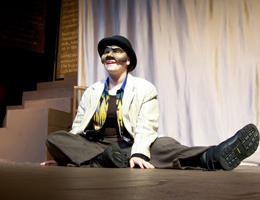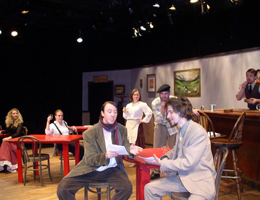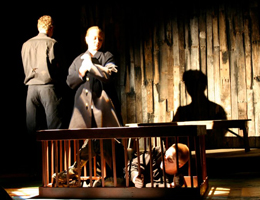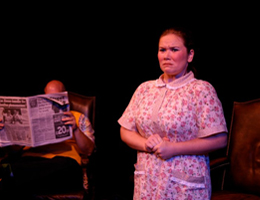Kaspar
October 25-29, November 1-5, 2006
Playwright: Peter Handke
Directed by: Barry Cavin
Performance Dates: October 25-29, November 1-5, 2006
Kaspar Houser was imprisoned (probably by his mother) in a small windowless room from the time of his infancy until he was set free to be enlisted into the army or killed. When he emerged on the street of Nuremburg as a teenager, he had the ability to speak only one sentence: "I want to be a soldier like my father once was." This tragic tale served as Handke's inspiration for this theatrical event that explores both the constructive and destructive forces of language. Our production seeks to reveal the human story of how we use slippery and precarious symbols to define ourselves and sometimes destroy others. We also examine our mourning for the loss of our pre-linguistic selves and the divorce of symbol from its referent.
Picasso at the Lapin Agile
February 15-18, 21-25, 2007
Playwright: Steve Martin
Directed by: Ronal Stepney
This long running Off Broadway absurdist comedy places Albert Einstein and Pablo Picasso in a Parisian cafe in 1904, just before the renowned scientist transformed physics with his theory of relativity and the celebrated painter set the art world afire with cubism. Bystanders, including Picasso' agent, the bartender and his mistress, Picasso's date, an elderly philosopher, Charles Dabernow Schmendimen and an idiot inventor introduce additional flourishes of humor. The final surprise patron to join the merriment at the Lapin Agile is a charismatic dark haired singer time warped in from a later era.
Woyzeck
April 11-15, 18-22, 2007
Playwright: Georg Büchner
Translation by: Dan Farrelly
Directed by: Barry Cavin
A victim of forces beyond his control,Woyzeck represents one of the earliest examples of the anti-hero. Written by a twenty-four year old more than one hundred years before Willy Loman stooped onto the stage, this highly theatrical play is a mini-epic about the life of a dutiful soldier who allows a crazed doctor to restrict his diet to nothing but peas. As a result, Woyzeck's deep sense of morality becomes unhinged, leading him to a disastrous and tragic end.
Sometimes you just want to push back a little. You get a little satiated with visual stimuli and you need a little relief. You need some words, some good old-fashioned text. Words that make sense, that tell a story, that get the imagination firing. You need that connection to a time when words mattered and words constituted observable realities and nobody questioned your authority. A time when you could talk to your friends and know that you were being understood.
The Bald Soprano is a delightful little story of some friends spending a casual evening doing nothing but having a pleasurable conversation. Ours is the pleasure of basking in the shining light of their meaning.





